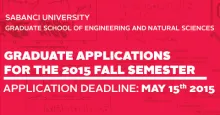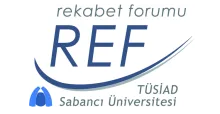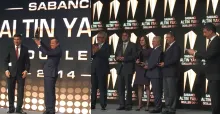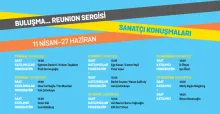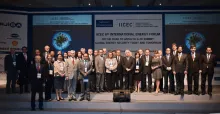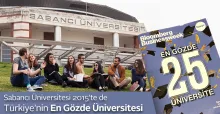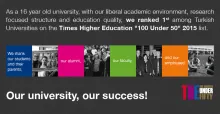Sabancı University receives Honor Award and Special Award in the Sabancı Golden Collar Awards
The winners of the sixth Sabancı Golden Collar Awards were announced.
The winners of the sixth Sabancı Golden Collar Awards to recognize the achievements of Sabancı Group companies and employees and to encourage sharing best practices received their prizes at an awards ceremony on Wednesday, April 29 at the Sabancı Center.

Sabancı University and the Sabancı Foundation received Honor Awards for their contribution to the Golden Collar Awards initiative. The prize was received by Secretary General Haluk Bal. Kordsa Global and Sabancı University also received Special Awards, and the recipients of the award in the university were Hasan Mandal, Yusuf Menceloğlu and Volkan Özgüz.
The master of ceremony was Cem Davran, and attendees included Sabancı Holding Board of Directors Chair Güler Sabancı, CEO Zafer Kurtul, Group HR President Neriman Ülsever, directors of the Group, and employees.
Sabancı Holding Board of Directors Chair Güler Sabancı said, “The Sabancı Golden Collar Awards are the best manifestation of the value we give to our people.”
In the introductory remarks of the ceremony, Sabancı Holding Board of Directors Chair Güler Sabancı said: “The Sabancı Golden Collar Awards began 6 years ago, in 2009. Thanks to you, the awards are now an exceptional occasion. As I had said in 2009 when we gave the first Sabancı Golden Collar Awards, this was the beginning of a journey to perfection. I am now delighted to see that the journey is going really well with your enthusiasm, dedication, participation and ownership. As an event where Sabancı Group companies inspire each other and share their knowledge and experience, the Golden Collar Awards is your program, your awards and your success. This year we have a new category in our awards: Digitalization. This category received 53 submissions from 9 Group companies. Such great interest in the category right from the start shows how well our companies have adopted this issue. Digitalization reshapes ways of doing business across all industries and affects our private lives as well. This compelled us to start the new category. We believe that we will be successful, and that we will be rewarded with even more success. People are our focus in everything that we do. The Sabancı Group does research for people, works for people, produces for people. And the Golden Collar is the embodiment of our commitment to our people. The Golden Collar rewards valuable ideas, projects and initiatives that seek to add value to human life. But as I always say, no one is a loser in the Golden Collar Awards. Some may receive prizes, but we all win in the end. We all learn, improve and win.”
The Sabancı Golden Collar Awards were given in 8 categories this year. Akçansa came first in the Value Creator category. Equality at Work and Investment in People awards went to Brisa, while Temsa Global won in Efficiency and Çimsa in Innovation and Corporate Entrepreneurship. In the Market Focus category, Akçansa came first in the individual subcategory and Çimsa in the corporate subcategory. The winners of the Synergy category were AkSigorta and Enerjisa teams. The award in the new category of Digitalization went to Akçansa. Sabancı University and Sabancı Foundation received Honor Awards for their contribution to the Sabancı Golden Collar Awards.

FULL LIST OF SABANCI GOLDEN COLLAR 2014 AWARD WINNERS
HONOR AWARDS
SABANCI UNIVERSITY
SABANCI FOUNDATION
SYNERGY
AKSİGORTA & ENERJİSA
ESİN CEREN AHISKA, IŞIL AVKAN AYDINOĞLU, MUSTAFA ONUR ERTUĞRUL, ÜNVER YALINCAK
SPECIAL AWARD KORDSA GLOBAL & SABANCI UNIVERSITY
HASAN MANDAL, YUSUF MENCELOĞLU, VOLKAN ÖZGÜZ, MEHMET YILDIZ, ÖZGÜR YILDIRIM, DENİZ KORKMAZ
HONORABLE MENTION CARREFOURSA & AKBANK
PINAR ŞENER, SİBEL OLTULU, FARUK SENEMOĞLU, MURAT NAKAŞ, MURAT DERMAN, DİLARA MELAN SEVİ, ORÇUN EKİM
HONORABLE MENTION AKÇANSA & ÇİMSA
İSMAİL GÖKALP, ATİLLA DOĞAN KESKİN, DUYGU ÖZCAN, ERMAN DERİN, MERVE ÖZKAN, SÜLEYMAN BURÇİN ALTINÖZ, BAHATTİN SOYLU
INNOVATION AND CORPORATE ENTREPRENEURSHIP
FIRST PRIZE ÇİMSA
TUĞHAN DELİBAŞ, ERSOY NİSANOĞLU, MEHMET AKİF ALBAYRAK, CUMALİ GÖKÇEDAĞ, KADİR ŞAHİN, BAHADIR ÖZTÜRK, EROL GULDOĞAN, KENAN ÇİÇEKALP
HONORABLE MENTION KORDSA GLOBAL
ZAYİM SAYGILI, OKAN ATAMAN, SELÇUK GEDİKLİ, YÜCEL AYYILDIZ, YASİN ŞEN, ELİF ERDOĞAN, EMEL EREN, NESLİHAN GÜLBEYCAN, NURÇİN JAVAHERİAN, ÜLKÜ KATIRCI
HONORABLE MENTION ÇİMSA
TUĞHAN DELİBAŞ, LEVENT ÇELENK, HAKKI DAL, OĞUZHAN YURTSEVER, ERSOY NİSANOĞLU, M.AKİF ALBAYRAK
HONORABLE MENTION KORDSA GLOBAL
OKAN ATAMAN, HÜSEYİN ATEŞ, EGEMEN BİLGE, ELİF ERDOĞAN, ÖZLEM TÜRKARSLAN, ZAYİM SAYGILI, DENİZ KORKMAZ, İBRAHİM YILDIRIM
EFFICIENCY
FIRST PRIZE TEMSA GLOBAL
KAAN KOZACIOĞLU, DURMUŞ DÖNMEZ, İSMAİL DÜNDAR, GÜRKAN CANARA, MEHMET AKARCA, İBRAHİM ÇAĞLAYAN, OZAN MARUFOĞLU, FERİDUN TANIR
HONORABLE MENTION KORDSA GLOBAL
SİNAN ÖRENGÜL, SAFİYE YAVUZ, HACI HÜSEYİN ÇELEBİ, MUHSİN TOKEL, HAKAN KAYA, ALİ VARAL, HASAN ERİS, BAHADIR UZKESER, ERKAN BAYRAKTAR, ERSEL EFE, NİLSON FRANCO DOS SANTOS, ARRAZY BAGUS TRİFFİLASETYO, SATRİA MUKTİ NUSWANTARA, MARK BYRD, PİTAK BUNPROM, CAHİT ERDEM, LEVENT BEKAROĞLU, SAMART CHİMPONG
HONORABLE MENTION ÇİMSA
KADİR ŞAHİN, KENAN ÇİÇEKALP, ARİF YAZAR, MAHMUT ABAR, ÖMER ANAÇ, AHMET CANATAN
INVESTMENT IN PEOPLE
FIRST PRIZE BRİSA
HONORABLE MENTION ENERJİSA
HONORABLE MENTION KORDSA GLOBAL
DIGITALIZATION
FIRST PRIZE AKÇANSA
TARKAN BÜYÜKBAŞARAN, FAHRİ HATİPOĞLU, GONCA SARGIN, GÖKTUĞ AKTAŞ, ERDAL ÖNKOL, MUHİTTİN TARHAN, HİLMİ KALKAN, ÇETİN KARPUZCU, UMUT TEMUR
SPECIAL AWARD SABANCI HOLDING
SUAT ÖZYAPRAK, İREM POYRAZ, CANER BAYKARA, BÖKE YÜZGEN, GÖKALP ÖKTEM, SEDA TURHAN
HONORABLE MENTION ENERJİSA
ALİ VOLKAN ÖZDEN, ALEV ORBAY, ESRA KARABACAK, COŞKAN YETGİNER, EBRU ÖZTÜRK, MAHİR KURU, İLKAY KILIÇ, BUĞRA HAN ÇAĞIRAN, MEHMET ERKAN GÜNAL, MEHMET TARGÜN, MELİKE KAZANÇ, BURAK AÇIKGÖZ, MURAT KARAHAN, SELÇUK ÇELİK, SİNAN AYDIN
HONORABLE MENTION KORDSA GLOBAL
HAKAN EDİS, FATİH AKAR, HALİL ŞENKAL, GÖKÇE ÖZARAR, ALPER KIRMIZIOĞLU, EMRE ÇELİK
MARKET FOCUS
INDIVIDUALS SUBCATEGORY FIRST PRIZE AKÇANSA
ONUR YAZGAN, MUSA KEŞAPLI, AHMET ÖRDEK, EMRE AKINCI
CORPORATE SUBCATEGORY FIRST PRIZE ÇİMSA
ONUR İNANOĞLU, LEVENT ÇELENK, ALİ ÖZDEMİR, TUĞHAN DELİBAŞ, AZİZ UĞUR OCAKÇIOĞLU, SERKAN KANSAV, HANDE ÇELENK, KAMİL KURTARAN
EQUALITY AT WORK
FIRST PRIZE BRİSA
SECOND PRIZE ÇİMSA
THIRD PRIZE AKÇANSA
VALUE CREATOR
FIRST PRIZE AKÇANSA
HONORABLE MENTION AVİVASA
HONORABLE MENTION




